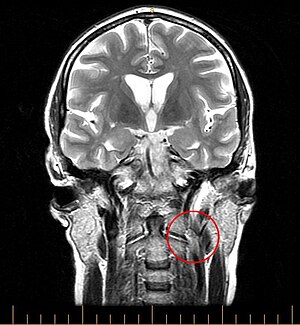I recently posted a piece titled "Surfing an Emotional Tsunami", in which I talked about the overwhelming torrent of emotion that comes bundled in the Multiple Sclerosis package (click here) . One astute reader commented that I had left out a very important feeling with which he often saw his MS stricken wife struggle: frustration. And, of course, he was absolutely right. The more I thought about it, the more it became clear to me that frustration plays such a large role in the experience of MS patients that it deserved a post of its own. MSers experience frustration on so many different levels that it's presence can almost be taken for granted, like the air that we breathe. Unlike life-giving oxygen, though, frustration can be suffocating, and in fact can be the seed of many of the other negative emotions that plague MS patients: fear, anger, guilt, desperation. Frustration strikes on many fronts, and MS patients battle it in its myriad forms over and over each and every day.
The disease itself frustrates all that it touches; patients, their loved ones, and the doctors who tend to them. The infrastructure that has grown up around the disease, a multibillion-dollar a year engine for which MS is the fuel, generates its own set of gargantuan aggravations. And the world itself, in which an increasingly disabled person can start to feel more and more alien, holds perhaps the most implacable frustrations of them all.
Let's start within the patient, and work our way outward. Upon diagnosis, patients are told that we have an incurable disease (frustration of the terrifying variety) that, despite over 150 years of research, medical science barely understands (mind-numbing frustration). Our immune systems for reasons unknown have gone on the fritz, we are informed, and have become cannibalistic, slowly devouring our own central nervous systems (petrifying frustration). The more questions we ask, the less clear the picture becomes, and as questions beget questions, the mind begs for answers that simply aren't there (intellectual frustration). We are trapped in a medical Rubik’s cube, and despite decades of endless turning and twisting, the goddamned colors refuse to line up.
As the disease progresses, its attendant frustrations, often suffered in silence, progress right along with it. The nagging disturbance of a numb or weakened limb slowly morphs into the outright horror of a once faithful leg or arm that has become totally dysfunctional, more a hindrance to be overcome than the helper that it used to be. The frustration I feel when I am forced to use my still functional left arm to physically place my now useless right arm into some out of the way position is indescribable. Despite my never-ending attempts at ferociously willing the damned thing to move, that arm becomes ever more and more unresponsive, as if it were part of a corpse grafted onto my body.
As physical dysfunction spreads, no amount of willfulness is able to impede its momentum. The frustration involved in watching oneself whither away is simply beyond words. When medical science first recognized MS as an identifiable disease, one of the earliest names given to the condition was "Creeping Paralysis", a discomforting label to be sure, but one that much more accurately describes its horrors than any of the medical jargon now used to conveniently camouflage the realities of Multiple Sclerosis. Million dollar words like spasticity and paresis do nothing but dress up in ludicrously antiseptic scientific jargon the fact that I can't move my fucking arm or leg. I'm not a case study in a scientific paper, I'm a human being with creeping paralysis. Frustration…
Each of the physical losses inflicted by the disease frustrates the execution of everyday tasks that in the past never even warranted a second thought. I very often find that my losses reveal themselves in the countless simple acts that it takes just trying to get dressed and out the door. Can the word "frustration" even begin to describe the emotion I feel when I discover that some of last year's difficult tasks have now become damn near impossible? When last December's barely winnable struggle to put on my right sock has now become an unworkable nightmare? When such inconsequential modern conveniences like the zipper on my favorite leather jacket have suddenly been transformed into infernal devices seemingly designed specifically to illustrate just how brutal a toll this disease has taken on my body? Certainly, there must be a mightier word, but for now frustration will have to suffice.
For those who love and care for us, watching the disease’s effects from the outside in is its own particular brand of torture. Though I don't have any children, I can only imagine the helpless anguish a parent must feel watching their child struggle with the disease, no matter the age of the parent or the child. The only personal experience I have that might begin to compare would be the gut wrenching desperation I felt as my beloved Labrador Retriever Stella (click here) succumbed to cancer. Though I know such a comparison might make a mockery of the parent-child bond, it's the closest I can come, and at least I could take some comfort in the fact that my canine friend had lived a relatively normal life span. But there can be no such comfort for a parent watching their adult child, the essence of their own flesh and blood, gradually become diminished. Can a young son or daughter's immature mind even process the sadness, anger, and frustration of having a dad who can no longer play catch, or a mom who needs to be mothered? And those spouses who decide to stick by our sides, dauntless spirits all, navigating the treacherous path laid out by MS, not out of necessity but by sheer love and devotion, how to define their courage? I've been given no other choice but to follow this road, but for my wife Karen exit ramps abound. And yet, by the grace of all that is good, she remains. Somehow, she remains.
Conversely, the frustrations felt by those who love us can in turn incite yet different shades of that same emotion deep within we who suffer from the disease. Despite mutual attempts to shield each other from the hurt, it's plain to see that our physical and emotional pain is causing those we love distress, and like the chain reaction that generates an atomic blast, frustration from all sides collides and mutates, simultaneously leaving too much said and too much unsaid, for the region between "dwelling" and "denial" is narrow and almost impossible to navigate. Every day small talk can become unbearably trivial, yet speaking of nothing but disease is poison for the soul. Phone calls from the concerned can come too often, or not often enough, and social invitations become objects of synchronized dread and delight. Yes, I would love to meet you at the café for coffee, but there is this thing about the zipper on my coat, and I don't know if next Tuesday will be one of those days that I'm simply too tired to get out of bed, and if it rains my wheelchair becomes as useful as an anchor. Frustration…
Many times simply being a member of the human race in a world that naturally caters to the well can conspire to frustrate at every turn. I flip on the television and see commercials hawking products that not long ago might have filled me with consumerist desire, but now are almost comically useless to me. What am I going to do with a shiny new Jaguar? Watching a sporting event and marveling at the incredible physical talents of the athletes involved, I sometimes can't help but reflect on the fact that the man making that impossible catch is doing it with far more ease than my increasingly futile attempts to simply put one foot in front of the other. Lovers delightfully snuggling on a park bench, that business suited jackass blindly walking through a crowd oblivious to everything but his blackberry, the single eight inch step that keeps me out of countless shops and restaurants, the everyday problems with office politics and petty relationships that so consume the healthy but, through the lens of far greater troubles, have now been revealed to be nothing more than trivial distractions. Frustration. Never-ending, unrelenting, heartrending frustration…
On an entirely different plane are the frustrations large and small of becoming trapped in indentured servitude within the universe of modern medicine, as a chronically ill patient must be. It didn't take all that long for me to go from being blissfully ignorant about some faraway malady called Multiple Sclerosis to the shocking realization that the gleaming miracle machine commonly presented as 21st-century medicine is simply a tremendous ruse. Despite all of its high-tech wizardry and and the considerable brainpower of its highly trained physicians and healthcare practitioners, modern medicine is first and foremost a fantastic engine for generating astronomical wealth for a gaggle of corporations, often at the expense of the very patients it purports to benefit. In many ways it's a money machine that feeds on sick people. Multiple Sclerosis, because it has revealed only enough of it secrets to make its treatment a highly profitable endeavor, is almost the perfect disease to unmask the sleek veneer of modern medicine and reveal the unsightly leviathan within.
For those "lucky" enough to have one of the more treatable forms of the disease, the medicinal remedies offered make all too real the expression "pick your poison". None of these medicines do anything at all to address the still unknown underlying cause of Multiple Sclerosis. Instead, by modulating or suppressing the intricate and poorly understood human immune system, they temper the paralyzing attacks suffered by those with Relapsing Remitting Multiple Sclerosis, without doing a damn thing to cure them.
These drugs do increase the quality of life of many of those taking them, as fewer relapses certainly make for a more pleasant existence, but at best the evidence shows that they may slow down the eventual progression of the disease, but they certainly don't stop it. As an added kicker, all of these medicines carry with them troublesome side effects. The least effective "Disease Modifying Drugs" commonly make those taking them suffer from "flu-like" symptoms, which, roughly translated, means they make people feel like shit. Better to feel like shit then suffer from paralyzing MS relapses, but certainly no panacea. Furthermore, these drugs only help about one third of the people taking them. How's that for frustrating?
The newer, more effective (and more costly) drugs profoundly impact the workings of the human immune system, and carry with them the possibility of some terrifying side effects, including brain infections and cancers. None are ever trialed for more than two or three years, so their long-term effects remain unknown, but patients are expected to rely on them for a lifetime. What affect will disabling half of my immune system have in five or 10 years? Well, we don't know, but just sign on the dotted line and let's hope for the best. Frustration…
Those like me, with the progressive forms of the disease, who don't suffer "attacks" but instead experience a slow and steady decline, are left with the choice of doing nothing, practically assuring a gloomy outcome, or partaking of the above-mentioned remedies, with little hope of experiencing the benefits realized by the folks who suffer relapses. Since I personally find the idea of doing nothing anathema, I've subjected myself to the full gamut of therapies and concoctions offered up by modern medicine, despite the knowledge that chances are they would likely do me no good. Indeed, this has been the case. I've received no benefits from these shots in the dark, and rather than simply do me no good, some of them have actually worsened my condition. Frustration, self doubting, 20/20 hindsight frustration…
And now we have the hope of CCSVI, the so-called vascular theory of MS. After decades of largely fruitless research focusing on the immune system, there comes the stunning revelation that abnormalities in the veins that drain the central nervous system may play an integral part in the MS disease process, and perhaps might even be the long-sought cause. Even if not the cause, anecdotal evidence suggests that at the very least, the clearing of these abnormalities through the use of a relatively simple, minimally invasive surgical procedure may relieve some of the symptoms borne by those with the disease.
Instead of the eager cooperation one might expect to find between the various medical disciplines required to fully test the theory, we get an eruption of the equivalent of a medical food fight, with researchers, physicians, and politicians brawling over how and even whether to test the hypothesis. Patients, at last energized by an intoxicating dose of hope, are caught in the middle, looking on incredulously as academic and bureaucratic arguments delay the relatively simple trials that would be needed to prove or disprove the theory. If there were pharmaceutical fortunes to be made from CCSVI, you can bet your ass that sophisticated trials would have commenced long ago. But no, corporate profit potential is lacking, and so it has been left largely to the patients themselves to foment what could be a medical revolution. Frustration. Angry, seething frustration…
How to deal with the many hued variations of frustration met by those dealing with Multiple Sclerosis? If only there were an easy answer, a meditation or incantation that would simply make it all fade away. But no, we must be steadfast through the storm, letting neither the past nor the future cloud our experience of the present. All of the emotions engendered by Multiple Sclerosis, frustration included, give every one of us dealing with the disease the perfect right to curl up into a ball and bemoan our fates in a deserved orgy of self-pity. And perhaps it's best that on rare occasions we allow ourselves to do just that, to let loose with a guttural wail of anguish. But for the vast majority of the time, we must steel ourselves to take control of our emotions, to experience each day moment by moment, making the numberless conscious decisions that allow us to not only survive but to thrive in the face of undeniable and treacherous adversity. We must not deny ourselves the right to contentment, for contentment and even happiness must be created by every individual from within, attained by a total immersion in the moment, and finding that small kernel of good always contained in the now. We cannot deny our feelings, but we can work with them to discover our own very personal sense of ease, frustrations be damned.






